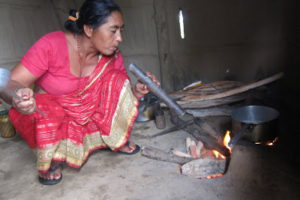This post was originally published by Empower Generation, which merged with Pollinate Energy to form Pollinate Group in 2018.
Sita Adhikari guides the Empower Generation team through the small, impoverished village of Kumroj. A few years ago, Sita founded a women’s savings and credit cooperative to pool small amounts of community money, and extend credit to women, often referred to as “the poorest of the poor”. Every villager we meet knows Sita and greets her warmly; she has worked tirelessly over the years to improve these people’s lives.
Our affiliation with Sita signals to the community that we are not tourists. We are not just passing through en route to the national park, snapping picks of the villagers out of open-backed trucks without slowing down, as if they were King Fishers or wild elephants.
The poverty is overwhelming. In some households, the trappings of domestic abuse, mental illness and unsanitary conditions are too much for us to take. Some of the team have to excuse themselves and wait in the road. Even Sita, one of the strongest people I have ever had the honor to know, gets choked up at the sight of women and children living in unthinkable circumstances. “This… is so hard for me to see.”
While the troubles facing this community are far too numerous to list, energy stands at the core of many of them. Coughing, red-eyed women emerge from smoky huts where they are preparing their family’s dinner over open fire. Throat and lung problems abound, exacerbated by the inability to afford appropriate treatment. Nightly power cuts necessitate hazardous kerosene torches which dimly light the homes that can afford them, providing dangerous, insufficient light for children to study or women to work on producing handicrafts.
Most dwellings in this village look similarly poor, made from mud and thatch, but one stands out as conspicuously prosperous. Cement and tin have replaced mud and sticks. I am surprised to see a satellite dish, a proper grid hook-up and a ceiling fan. I ask Sita, “How is it that this household is so much wealthier than its neighbors’?”
Sita explains that the father of that family is working somewhere in the Middle East, probably as a construction worker, and sending remittances back home. Meager earnings from the Middle East go a long way in Nepal, it seems. In fact, remittances have been estimated to amount to 23% of Nepal’s GDP.
I am glad that this man has the opportunity to earn good money abroad and enrich the lives of his family. That being said, it saddens me that he had no opportunity to make a viable income in Nepal, and I can’t help but consider what kind of person I might have become had my father been abroad for much of my childhood in an effort to provide for my family.
I remember why Empower Generation exists, why Anya and I are working so hard to get this organization off the ground: We are working to give people choice—the choice to make a viable income in one’s own community, and to resist the promise of work abroad that increases vulnerability to human trafficking.
As we left Nepal, the first leg of our journey was from Kathmandu to Doha, Qatar. The plane was filled with Nepali men leaving their communities to take construction jobs abroad. Many appeared timid, shaking and sad as the jet engines roared them away from the awe-inspiring Himalayas toward the promise of prosperity in the deserts of the Middle East.
“Risk and danger have been the name of the game for many for many foreign Nepali workers,” notes Sujeev Shakya. Our hope is that Empower Generation will soon give more Nepalis the choice to make a better life for themselves at home.

